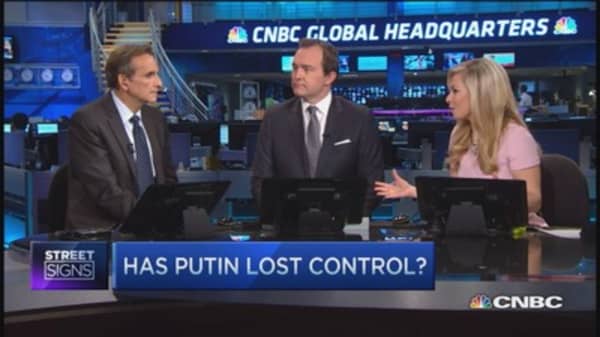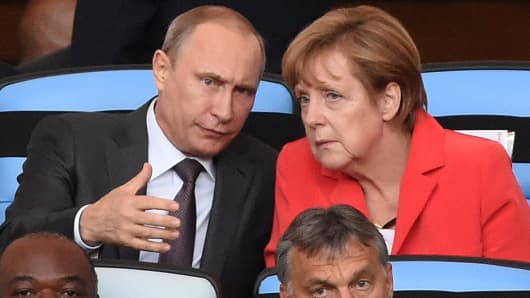That is why Germany plays a key role in resolving the current impasse. Chancellor Merkel is unique in her relationships of trust and influence with Presidents Putin and Poroshenko. For Russians and Ukrainians, Merkel is the key to Europe. The EU and the United States need to coordinate with her team, but she must lead this process.
Read MorePutin speech sparks more ruble volatility
The elements of a deal are well known. Russia needs to take its troops out of Ukraine, stop all support for the insurgency in Ukraine, and cease its media battle against the Ukrainian people and state. Ukraine must devolve authority to local governments and ensure that language and culture are not used as a personal referendum on who is a Ukrainian citizen. Russia must sell gas to all parties to its west on market terms. Ukraine must transit gas and pay its bills for the gas it consumes.
All parties must accept a massive presence by the Organization of Security and Cooperation in Europe to monitor the Russia-Ukraine border and developments on ground in Ukraine. The minute one observer is jailed or mistreated, the deal is off. Some will try to try to solve Crimea's future in this package. That is too complicated and must be deferred.
In exchange for its retreat from Ukraine, Russia will receive access to capital and to the technology to develop its energy resources. Ukraine must rise to implement the economic reforms that will win the confidence of international donors and investors and make its economy competitive.
Failure to grab this moment would be tragic. Russia's alternative is a deepening economic crisis that could lead to internal protest. Expect President Putin to respond with an iron hand that entrenches his authoritarian control on politics and economics. Ukraine's alternative is a continued freefall as the war in the east drains its coffers and makes economic reform seemingly insurmountable.
Sanctions are a policy tool to create opportunities for better outcomes. The collapse in international oil prices has turned that tool into an opportunity that can restore an economic livelihood to Russia and Ukraine. Skeptics will argue that Russia simply wants a Ukrainian frozen conflict, even if it abuts against Russia's own internal economic collapse. But perhaps this is the moment to test President Putin's interest in a better future for his citizens. For Russia and Ukraine, there are only upsides to try.
Commentary by Jason Bordoff and Carlos Pascual, who are, respectively, founding director and fellow at Columbia University's Center on Global Energy Policy. Ambassador Pascual established and directed the State Department's Energy Resources Bureau as Special Envoy and Coordinator for International Energy Affairs from 2011 to 2014 and has served as U.S. Ambassador to Mexico and Ukraine. Mr. Bordoff previously served as a White House energy advisor to President Obama from 2009 to 2013. Follow them on Twitter @pascualce1 and @JasonBordoff.




